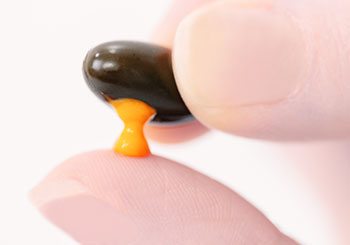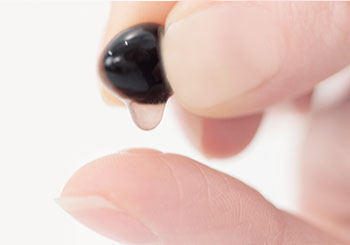Add images for the product gallery inside the div with red border. Remove the height and width when inserting the images
Set Alternative text for images
Add iframe with a youtube link, Iframes require a image thumbnail as the next sibling as well.
Connect iframe and iframe thumbnail sibling with id on the elements,
like so :
On iframe id="iframe1",
On iframe thumbnail image : id="iframe1thumbnail"
Add Long Description
Coenzyme Q10 as ubiquinol - 100 mg capsules
- Contains the reduced form of Q10 also referred to as ubiquinol
- Documented bioavailability and quality
- The combination of a special manufacturing method and encapsulation in propietary softgel capsules protect the ubiquinol from light and oxidation
- Manufactured under pharmaceutical standards and inspected by the Danish Medicines Agency (the Danish equivalent of the Food and Drug Administration)
- Please note that this is a Dutch package
BioActive Q10 Uniqinol 100mg
| 1 capsule contains: | % RDA* | ||
|---|---|---|---|
| Co-enzym Q10 as Ubiquinol (QH) | 100 mg | ** | |
| Vitamin C | 12 mg | 15% |
Dissolved in vegetable oil in soft gelatin capsules.
*RDA= Recommended Daily Allowance
** RDA not established
Product Facts
Directions
1 capsule daily, unless advised otherwise.
Swallow whole, preferably during/after a meal.
Do not exceed the recommended daily dosage.
Dietary supplements are not a substitute for a varied diet.
A healthy lifestyle and a balanced diet are important for maintaining good health.
Ingredients
Coconut oil, capsule shell: bovine gelatin, coenzyme Q10 (Ubiquinol), humectants: glycerol, purified water, vitamin C: L-ascorbic acid, cocoa powder, antioxidant: ascorbic acid, thickener: silicon dioxide
Storage
Dark, dry and at room temperature. Keep out of direct sunlight.
Keep out of reach of young children.
What is BioActive Uniqinol 100 mg?

BioActive Uniqinol features light-protected soft gelatin capsules with ubiquinol, the reduced form of coenzyme Q10 (QH), in coconut oil. Each capsule contains 100 mg of ubiquinol and 12 mg of ascorbic acid.
Dietary supplements with ubiquinol have one drawback: if ubiquinol is exposed to oxygen it returns to its original form as ubiquinone. By means of a special manufacturing process, however, Pharma Nord has succeeded in encapsulating the raw material in a way that allows it to remain in its reduced form.
The patented active ingredient in BioActive Ubiquinol is protected by a unique carrier to avoid oxidation and degradation of the ubiquinol in order to deliver the compound in its intended form.
Bio-Ubiquinol is a strong antioxidant and supports the body by replenishing low levels of QH.
Why BioActive Uniqinol?
- BioActive Uniqinol contains reduced Q10 (QH) in vegetable oil in light-protected softgel capsules
- The QH raw material in Bio-Ubiquinol is identical with the form of QH that is synthesized in the human body
- The form of QH used in BioActive Uniqinol is the natural, all-trans form that is entirely devoid of synthetic cis-isomers. In addition, it does not contain any pollutants that may occur in other QH raw materials. The product is manufactured in compliance with the guidelines for pharmaceutical drugs and is subject to rigid raw material quality assurance.
- Both the QH raw material and the vegetable oil in BioActive Uniqinol are guaranteed non-GMO
- BioActive Uniqinol is manufactured in accordance with pharmaceutical standards and has documented bioavailability and quality
What is coenzyme Q10?
Coenzyme Q10 or just Q10 is a fat-soluble vitamin-like substance found in the body in two forms: ubiquinone and ubiquinol (from Latin, ubique meaning ”everywhere”).
When a cell needs energy, it converts fat, carbohydrate, and protein, to ATP (adenosine triphosphate), a molecule that stores energy in its chemical form. The cell breaks down the ATP molecule and releases the energy trapped inside. The entire process takes place inside the cells in some small bean-shaped structures called mitochondria. Q10 is found in all mitochondria. Muscle cells are particularly dependent on large amounts of energy, which is why muscle cells contain substantially more mitochondria than other types of cells. The heart muscle is a good example of body tissue with cells that contain a large number of mitochondria and have a correspondingly large energy requirement.
Good Q10 Sources
Q10 is found in different types of food. Our diet contains both ubiquinone and ubiquinol in a 50-50 ratio. The best sources are foods like:
- beef
- pork
- herring
- soy oil
- sardines
The reason why Q10 cannot be called a vitamin is that the body is able to synthesize it. The endogenous production of Q10 takes place in almost all of the body's cells. As we grow older and also as a result of certain diseases, our body’s ability to synthesize Q10 tapers off. Experts estimate that the body’s Q10 levels peak in our early twenties. From this point onward, the body’s production of Q10 starts to decline.
Although it has not been established officially, the diet is believed to provide around 5-10 mg of Q10 daily. The body has a Q10 “buffer” of around 1 to 1.5 grams. The major part of this reserve is stored in the heart, kidneys, and liver.
Both Q10 and cholesterol are produced in the liver and share the same chemical pathway. Scientific studies have shown that certain cholesterol-lowering drugs inhibit the body’s natural production of Q10.
A Very Safe Substance
Studies show that even if you supplement with Q10 for an extended length of time it does not affect the body’s endogenous synthesis of the compound. Some studies have used doses of up to 1,200 mg daily without any problems. More than 20 years of science support the use of Pharma Nord’s Q10.
Q10 or QH – is one better than the other?
There are two natural versions of the vitamin-like compound coenzyme Q10. Chemically speaking, they are closely related. One is regular Q10 (ubiquinone) which is the oxidized form. The other is QH (ubiquinol) which is the reduced form. The body needs and uses both forms and is therefore able to convert one form to the other and vice versa, depending on which form of Q10 it needs for the specific task. Inside the cells' mitochondria, Q10 is constantly being switched back and forth between oxidized ubiquinone and reduced ubiquinol. One form is a electron donator, the other is an electron receptor. Both ubiquinone and ubiquinol are active forms of Q10
The big question that gets consumers all confused is what type of Q10 to take. The following may help clarify matters:
- No matter what form of Q10 you take it changes back and forth from one type to the other inside your body, once it has been absorbed in the digestive system
- Absorption studies show that the body can absorb both forms of the substance
- The Q-Symbio study (Journal of the American College of Cardiology, Heart Failure, 2014) used ubiquinone
- The scientists also used ubiquinone in the KiSel-10 study (International Journal of Cardiology, 2013), where Q10 combined with selenium improved quality of life in older, healthy men and women
- In fact, most of the existing studies that show an effect with Q10 supplementation are conducted with ubiquinone (regular Q10), which means that this form of Q10 has the best documentation
Another thing that deserves a note is that Bio-Quinone Q10, which is one of the most well-documented Q10 brands available, contains ubiquinone. This specific formula has outstanding bioavailability thanks to a special manufacturing technique that involves using different types of oil and a heating treatment to prevent the Q10 molecules from aggregating in large, indigestible crystal formations.
The Ubiquinol Test
Ubiquinone has a characteristic yellow color, while ubiquinol is white. A good way to test a ubiquinol product is to pierce the capsule and squeeze out its contents. If it is white, it is ubiquinol. If it is yellow, oxygen has tranformed it back into ubiquinone in the capsule.
Ubiquinone = Oxidized CoQ10 = Q10 =Yellow = Active

Ubiquinol = Reduced CoQ10 = QH = White = Active

What is vitamin C?
Vitamin C is also called ascorbic acid. It is a water-soluble vitamin with many functions in the body. Among other things, it acts as co-factor in a number of enzymatic processes. Vitamin C protects the body's cells against oxidative stress. It contributes to normal energy-yielding metabolism and it helps reduce fatigue and exhaustion.
Vitamin C's low pH-value helps stabilize the ubiquinol content of the capsule.
Variations in gelatin hardness
The hardness of our soft gelatin capsules can vary. The difference depends solely on the water content of the capsule shell. We dry all our soft capsules before packaging, which makes the capsules firmer and facilitates the packaging process itself. Over time, the capsules can absorb water from the air, and this will soften the capsule shell.
The variations in the hardness of the capsule have no effect on the product quality, but if a hard capsule is a problem, a solution may be to leave the capsule outside the blister sheet for a day, whereby the capsule can absorb a little water from the air. This is generally not something we recommend, as the product will no longer be protected as when it is in the blister sheet. Another method of quickly softening the gelatin capsule is to place it in lukewarm water for one minute. However, it should be seen as an emergency solution.
Official claims
The European Food Safety Authority (EFSA) has evaluated the evidence behind vitamin C and has acknowledged the following claims:
- Contributes to the reduction of tiredness and fatigue
- Contributes to normal collagen formation for the normal function of the blood vessels
- Contributes to normal collagen formation for the normal function of gums and teeth
- Contributes to normal energy-yielding metabolism
Related Products
 Bio-Carnitine as carnitine is involved in transport and oxidation of fatty acids into the mitochondria where Q10 contributes to their metabolism.
Bio-Carnitine as carnitine is involved in transport and oxidation of fatty acids into the mitochondria where Q10 contributes to their metabolism.
 Bio-Selenium+Zinc: Selenium contributes to the conversion back and forth of Q10 between its reduced and oxidized form, and zinc contributes to a normal immune function, fertility and metabolism..
Bio-Selenium+Zinc: Selenium contributes to the conversion back and forth of Q10 between its reduced and oxidized form, and zinc contributes to a normal immune function, fertility and metabolism..

Zymbion Q10 Toothpaste increases the amount of coenzyme Q10 in the gingival pockets. This external supply is complemented by internal Q10 from BioActive Uniqinol.


